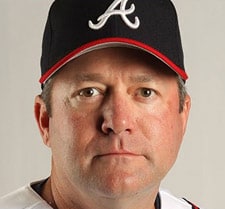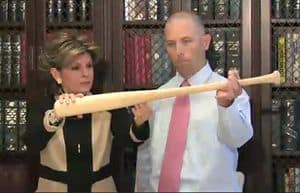Ari Ezra Waldman is a 2002 graduate of Harvard College and a 2005 graduate of Harvard Law School. After practicing in New York for five years and clerking at a federal appellate court in Washington, D.C., Ari is now on the faculty at California Western School of Law in San Diego, California. His research focuses on gay rights and the First Amendment. Ari will be writing weekly posts on law and various LGBT issues.
Follow Ari on Twitter at @ariezrawaldman.
 Roger McDowell pitched for the '86 Mets, that other New York baseball team. My sister was a fan of the team, so I remember seeing Mr. McDowell's dour, angry face in almost every Met win and more than a few of the team's losses. He finished the season with only 65 strike outs in 128 innings, but he was always the kind of pitcher that pitched to contact, getting you out with a hard sinker and a blazing fast ball. He was even better in the National League Championship Series, when he allowed only one hit in seven innings. And, yet, no one seemed to care that the guy was a total asshat.
Roger McDowell pitched for the '86 Mets, that other New York baseball team. My sister was a fan of the team, so I remember seeing Mr. McDowell's dour, angry face in almost every Met win and more than a few of the team's losses. He finished the season with only 65 strike outs in 128 innings, but he was always the kind of pitcher that pitched to contact, getting you out with a hard sinker and a blazing fast ball. He was even better in the National League Championship Series, when he allowed only one hit in seven innings. And, yet, no one seemed to care that the guy was a total asshat.
They called him a "prankster" for lack of a better word. He used to light fire crackers in dugouts, burned teammates' feat with cigarettes and, if you believe Wayne Knight's Newman from Seinfeld, he spit on fans.
Recently, Mr. McDowell's antics took a new turn. Before a game between the Atlanta Braves, for whom Mr. McDowell serves as pitching coach, and the San Francisco Giants, Mr. McDowell made various anti-gay remarks at a group of male fans. He made "crude gestures with his hips and a bat" at a man, his wife and their two kids. Mr. McDowell then allegedly said that children do not belong at a baseball park, picked up another bat, approached the father and asked him, "How much are your teeth worth?"
Many people, gay and straight, found this conduct offensive. And, after the NBA so decisively dealt with Kobe Bryant's recent anti-gay slurs, prominent community leaders like GLAAD's Jarrett Barrios and accomplished attorney Gloria Allred called for MLB Commissioner Bud Selig and Atlanta Braves owner John Malone to follow suit. They wanted, at a minimum, a hefty fine, a suspension, a PSA on the harm caused by anti-gay slurs and damages.
A regular Towleroad reader emailed me this question: "Doesn't McDowell have a First Amendment right to say whatever the [bleep] he wants as long as he doesn't hurt anyone? Isn't Gay Inc. making a federal case out of just some dude saying [bleep] that is typical for guys playing sports?"
I agree and disagree. Mr. McDowell's case is not about the First Amendment; neither the government nor any state actor is restricting his speech by punishing him. And, no one is making a federal case out of anything. But, my interlocutor is right about one thing — and not about my and other gay men's inability to relate to Mr. McDowell or Mr. Bryant because I don't play team sports. He is right that these men used words typical of men in sport. But that does not make using those words okay. The question for the gay community is how far do we want to go.
CONTINUED, AFTER THE JUMP…
Gay-related rhetoric is common in environments defined by their masculinity. Sports, rap, construction, ranching and, of course, cutting hair (I'm only half kidding about the last one… There's this barber shop run by Ukranian Jews in Chelsea whose barbers do not realize I understand Hebrew). Men in these industries do not always use anti-gay slurs against real or perceived gays and lesbians; that is, calling someone a "fag" is rarely meant as an accurate assessment of someone's sexuality. Instead, its a word bandied about by straight men trying to prove their heterosexual bona fides and to establish dominance over one another. That's just what men do.
And, that is the problem. Calling someone "Jew" in the trade and business worlds used to be a common slur about the target's parsimony, lack of ethics and all around "otherness." Yet, we no longer tolerate such comments even at the margins of society. We still call our business adversaries cheap and underhanded, but we do not call them "Jews." A man's attack on his athletic adversaries will probably always revolve around weakness. So, we have to divorce gay-related rhetoric from weakness.
We need Kobe Bryant to film anti-bullying PSAs, we need athletes to come out, we need our brave men and women in uniform to come out and you and I need to prove that being gay is no more synonymous with weakness than being left-handed or having red hair.
 But, this is not a case where the growing reach of the First Amendment is at fault. Free speech rights may prevent the state from passing a law criminalizing Mr. Bryant's slur, but it would allow the state to proscribe Mr. McDowell's threatening speech and conduct with a baseball bat. It is, therefore, irrelevant to this context since public laws are not at issue. Even if the First Amendment allowed you to say whatever you want, a private employer could punish you for your conduct if it does not comport with the company's standards. In other words, the First Amendment may permit you to call someone a "fag," but it does not guarantee you a job when you say it to your boss.
But, this is not a case where the growing reach of the First Amendment is at fault. Free speech rights may prevent the state from passing a law criminalizing Mr. Bryant's slur, but it would allow the state to proscribe Mr. McDowell's threatening speech and conduct with a baseball bat. It is, therefore, irrelevant to this context since public laws are not at issue. Even if the First Amendment allowed you to say whatever you want, a private employer could punish you for your conduct if it does not comport with the company's standards. In other words, the First Amendment may permit you to call someone a "fag," but it does not guarantee you a job when you say it to your boss.
Another federal law — Title VII — bans sexual harassment in the workplace. It allows employees who are victims of quid pro quo and hostile environment harassment to sue their co-workers and/or employers for harassment and doing nothing to stop the harassing conduct. At first blush, this law might seem applicable if Mr. McDowell used anti-gay sexual rhetoric against a player or member of the Atlanta Braves staff and the Braves and MLB did nothing to stop it. I am not so sure. While same-sex harassment is actionable under Title VII, gay-related rhetoric may be seen as part of the common give-and-take among men in sport. Title VII is not a civility code, and it should not be. But, that does not mean that MLB and the NBA cannot enforce their own codes of conduct.
The NBA and MLB have judged that anti-gay rhetoric does not belong in their games and the leagues can punish their employees as they see fit (in accordance with any relevant collective bargaining agreement). And while I believe that Mr. Bryant's and Mr. McDowell's misdirected anti-gay rhetoric is part of the common give-and-take among men in sports, we should strive for a world where it is not. And, to that end, the leagues have the right and responsibility to enforce civility among their players, fans and referees. In fact, the very ordinariness of the comments makes these private civility codes all the more important. Only when the leagues enforce these rules will professional athletes realize that anti-gay rhetoric is wrong, inappropriate and just unnecessary.



